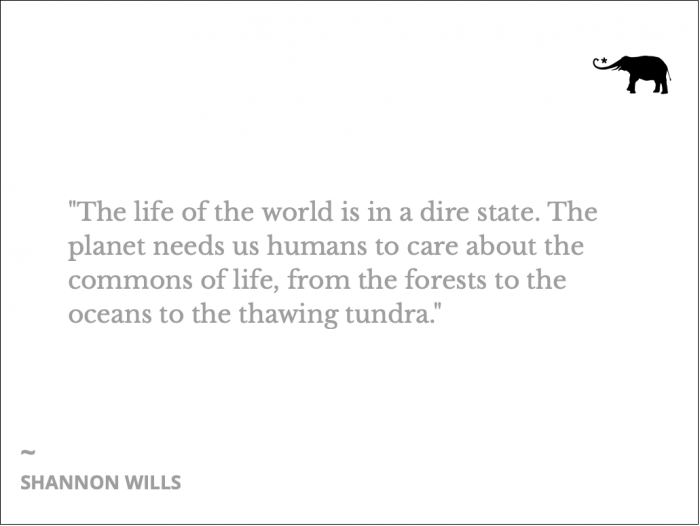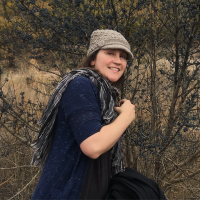There’s a ritual I practice every Sunday afternoon.
It’s a humble, worldly ritual, yet it connects me with the spirit that moves all life in a way that nothing else can.
Every Sunday, I water the plants.
Growing up, I never considered myself to have a green thumb and I didn’t know much about caring for plants. So when I inherited a carload of houseplants from my biological mother after she died, I knew I would have to learn.
In the decade since my mother’s passing, I’ve grown into an adept and attentive waterer. Once a week I circle around the house, stopping from room to room, tipping a long-necked metal watering can into the vessels of houseplants that make their home in nearly every window.
As I go, I stop to admire and tend to each plant. I pinch off dying leaves, rotate pots to accommodate for seasonal changes in light, adjust stems, and check saucers. I stand on tiptoe and wiggle my fingertips in the soil of hanging baskets to check if I’ve watered them enough. I circle back a second time to each plant once the water has settled through the soil to top up the water for those who need more, seeking the sweet spot that lies between giving enough, but not too much for everyone to thrive.
My weekly ritual reminds me that water is a commons.
In sociopolitical language, commons are public resources shared by the collective. Spaces where everyone can gather and give and take freely. Experiences owned by none and available to all. Parks and trails, sidewalks and streetside benches are commons. So are mountain views, the ocean’s edge where all can bathe, and the shade of ash trees on an urban parkway. Air, sunlight, the night sky, and the stars are all commons. Land was once a commons, but since we modern humans have the hubris (and the real estate contracts) to claim we “own” tracts of Earth and the life upon them, the concept of land as a commons has been largely lost. Yet we remain humbled in the face of water.
We cannot own water, no matter how much we try. We can use water, channel it, contain it, freeze, and thaw it. We can fight and kill for it, and we can pollute it. We can even steal it. But we can never own it.
Water slips from our fingers when we try to grasp it, evaporates should we try to encircle it, and deluges us with rain showers on its own schedule. It shapeshifts from solid, to liquid, to gas, and cuts canyons through solid rock. It cleanses all the world with its healing vapor manifest as rain. And there is nothing we can do about it. Nor should we want to.
Science tells us that our bodies are 70 percent water. Without water, we’ll dry up and die. Experience teaches us that water is a necessity. She quenches our thirst and blesses us with resilience, flexibility, and flow. Blood is water. Tears are water. Water is our every move. And spirit tells us that we are part of water, and she is part of us. We dance in a relationship of reciprocity, we the containing vessel, and she the prism that reflects the rainbow.
Water does not belong to life, and life does not belong to water. We belong to each other. Body, blood, breath: water is a bridge between the commons of the world, and the commons of the spirit.
When I inherited all those houseplants from my mother, I also inherited six cats and a dog.
The cats were accustomed to drinking their water, not from a standard sized cat bowl, but from a five gallon plastic bucket in the corner of the kitchen. The bucket was much bigger than needed, yet for six cats, it somehow seemed the right size.
Amused, I watched the cats not only drink from the bucket, but wade their paws through it, peer curiously at their own reflections, and scoop it over their whiskered faces to drink and groom themselves. Touched by this activity, I couldn’t bear to take the bucket away. I kept it, and renamed it the “swimming pool.”
Each week, the swimming pool got a little grimy with use and needed to be emptied, scrubbed, and filled with fresh water. It didn’t take long for me to recognize the opportunity: transfer settled water from the swimming pool to a watering can, and repurpose it to feed the plants. And thus began the ritual of feeding all the home’s life with one bowl.
I quickly sensed that I was operating my own microcosmic version of the water cycle. What in the macro would be transformation from ocean, to clouds, to rain, in my cozy little house was mirrored as tap, to bucket, to watering can. And behind both the phenomena of transmutation whispered its magic: water becomes air, ether, and the world of the unseen.
And so, my task of watering began to take on a timeless quality, and gave me a sense of participating in something ancient. In my ritual of care, I was no longer simply watering plants and scrubbing buckets; I was tending to the perennial cycles of life—not only tending, but participating. After all, don’t I also need water to survive?
Over time, I’ve learned that different plants like to be watered differently. The calathea loves to have water poured over her broad-striped leaves like a waterfall, dripping from her curves and edges to fill her saucer below. The jade plant tells me when she’s had too much water: she shrivels up a single leaf and drops it onto the rocky soil beneath her. And when the lily has had too little, she droops her leaves sorrowfully, one eye open to make sure I’m paying attention.
Aren’t we humans like this too? We all need the same basic elements for survival: carbon, oxygen, nutrients, sunlight, a place to spread our roots and call home, and water.
We, like the plants, each need these elements in different measures, more of one or less of another, depending on our nature. And we ask for them in different ways, too. It’s humbling to know that we humans have a deep, shared need for water, something we don’t own, and can’t control, which belongs to all.
Water gives herself to the lily and the jade as she gives herself to the songbirds in the morning birdbath, the sloppy grin of a dog paddling in the river, or the squeal of a child splashing in a mud puddle. And me, running barefoot and laughing into a rainstorm.
In interbeing, we get to simply be one more part of nature—we belong.
Recently, I’ve added a closing step to my weekly plant watering ritual. When the watering is done, the bowl is scrubbed, and all have what they need, I pour myself a glass of water and drink.
The life of the world is in a dire state. The planet needs us humans to care about the commons of life, from the forests to the oceans to the thawing tundra. The web of interbeing spans the globe like ocean water, and all our fates are suspended within it.
The need can seem so big that we may feel incapable to help, or unsure of what to do. This is where mother water can be our teacher. In her generosity she nourishes us all, plant, animal, humanimal (us), each in the place we are, according to our need. And in quenching our common thirst, she reminds us how intimately we’re all connected. Never does she stop to ask whether the task is too big.
Ironically, in a time of great collective need, it may be the smallest of tasks that teach us how to heal. What if we could sink into that great need, and feel our place in it? What if we could ask from there what small thing we have to give, and give it?
One small thing doesn’t solve every problem, but it does help us show up as part of the solution. We can start with what is close at hand, and give to each what is needed, knowing that should we cease to grasp and let our gifts flow, there will be enough for all.
From that place, we might remember our great power as one essential drop in the great ocean of spirit that moves all life. I remember, and I pick up my watering can.












Read 0 comments and reply